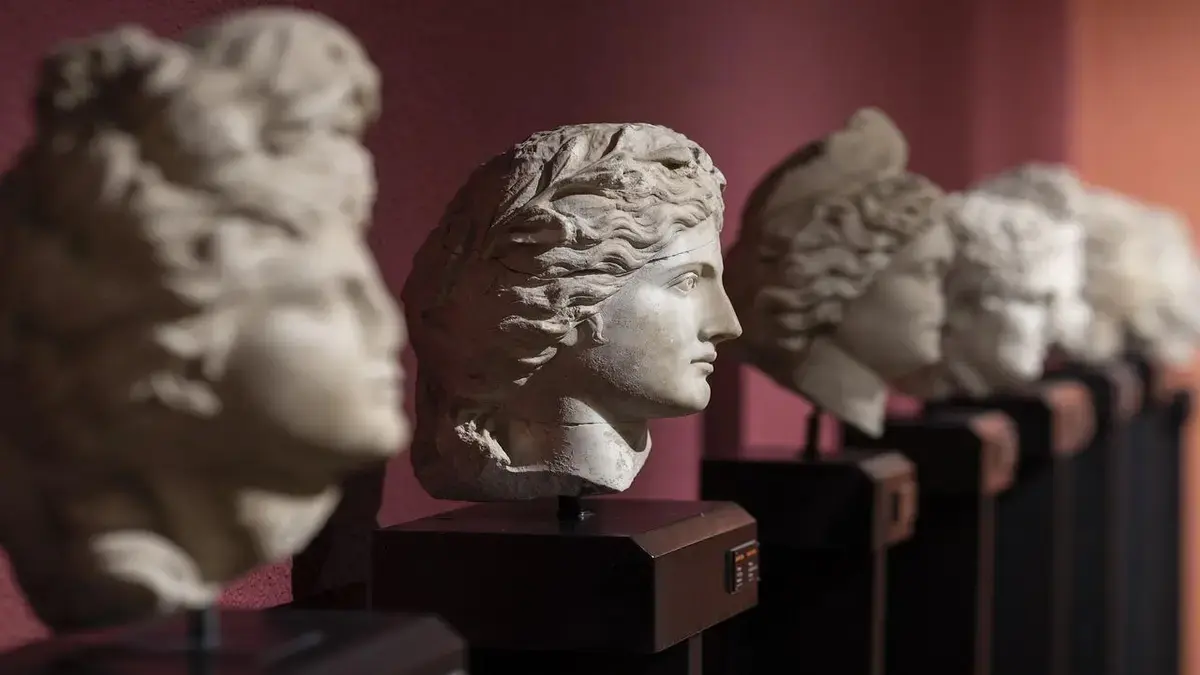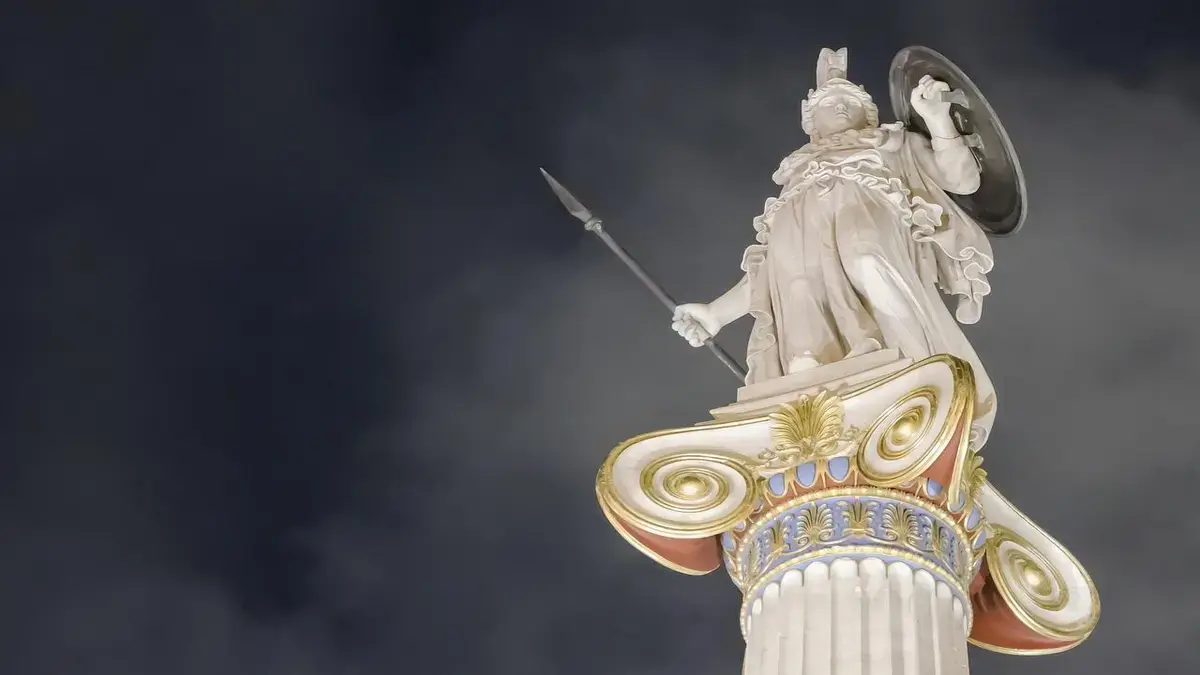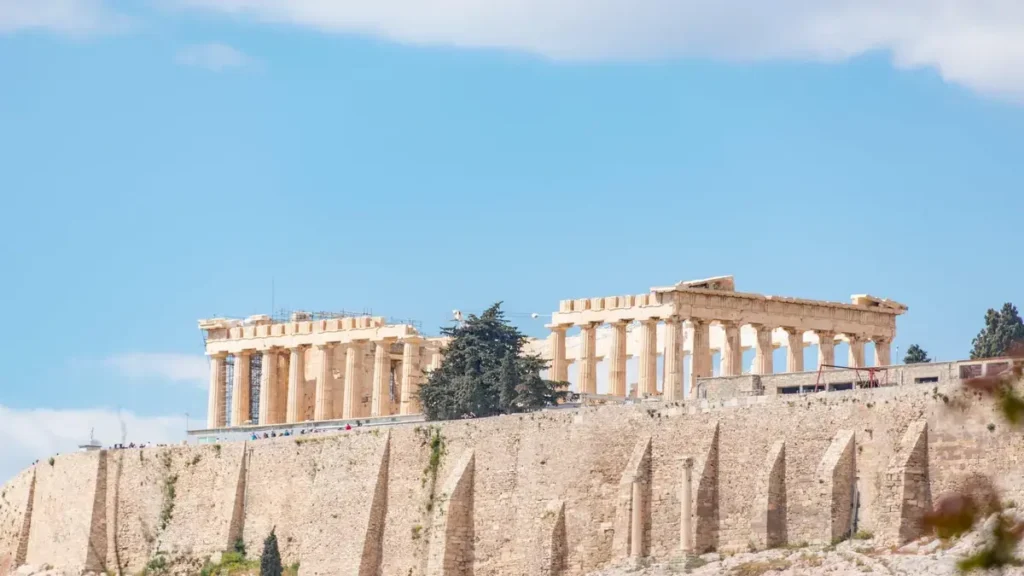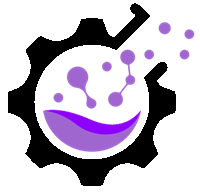Mythology Unveiled: Surprising Origins of Olympians
Mythology stretches far beyond its epic tales and legendary gods to touch the very fabric of our historical tapestry. This fascinating journey begins with the mighty Olympians and traces back to their astonishing origins, revealing a network of stories woven deeply into the existence of ancient societies. As we explore the intersection of these ancient narratives with the civilizations that treasured them, we uncover the profound influence that gods and heroes have had on our own methods of storytelling. With each tale passed down through generations, the impact of mythology continues to shape our books, films, and imaginations, ensuring that these age-old legends never fade into oblivion but rather evolve to captivate us in new and unexpected ways.
Key Takeway
- Olympians come from ancient Greek stories
- Zeus, the king, had a really powerful dad
- Some Olympians weren’t born the usual way
- Heroes and monsters are part of their family too
- Places in Greece are named after these myths

Tracing the Roots of Mythology through Olympian Ancestors
Mythology is not just a collection of stories; it’s a window into the beliefs and cultures of ancient civilizations. When we explore Greek mythology, we’re diving deep into a world where gods and goddesses interact with humans and shape their destinies. The Olympian gods, in particular, are a central part of these myths, and understanding their ancestry helps us grasp the complexity of these tales.
The Primordial Deities
Before the Olympians, there were the primordial deities. These were the first gods and goddesses who emerged at the creation of the universe. They represent the basic components of the world and the cosmos. In Greek mythology, these entities are often depicted as massive and powerful forces.
| Deity | Representation |
|---|---|
| Chaos | The void from which everything else sprang |
| Gaia | Earth, mother of all life |
| Tartarus | The deep abyss, a dungeon for the wicked |
| Eros | Love and procreation |
From these primordial beings came the Titans, who were their direct offspring. The Titans were a powerful race of deities that ruled during the legendary Golden Age.
The Titans and Their Role in Mythology
The Titans play a crucial role in the history of Greek mythology. They were the ones who preceded the Olympians and were eventually overthrown by them. The most well-known Titans were Cronus and Rhea, who were the parents of the first generation of Olympian gods.
| Titans | Domain |
|---|---|
| Cronus | Time and the ages |
| Rhea | Fertility and motherhood |
| Oceanus | The sea |
| Hyperion | Light and observation |
In my opinion, the story of the Titans is fascinating because it sets the stage for the drama that unfolds with the Olympians. It’s a tale of power, betrayal, and the cyclical nature of time, as the children eventually rise up against their parents.
The Rise of the Olympian Gods
The Olympian gods are perhaps the most famous figures in Greek mythology. They are known for their distinct personalities, powers, and the myths that surround their interactions with each other and with humans.
| Olympian | Domain |
|---|---|
| Zeus | Sky and thunder, king of the gods |
| Hera | Marriage and family |
| Poseidon | Sea and earthquakes |
| Demeter | Agriculture and the harvest |
These gods and goddesses were born from the union of the Titans Cronus and Rhea. However, their rise to power was not peaceful. It involved a great battle known as the Titanomachy, where the Olympians, led by Zeus, fought against the Titans for control of the universe.
Mythological Family Trees
Understanding the family trees in Greek mythology can be quite a challenge. There are so many gods and goddesses, each with their own stories and connections. However, these family trees are crucial for understanding the relationships and dynamics between the characters in these myths.
Zeus’s Family Tree
As the king of the Olympian gods, Zeus’s family tree is particularly complex. He had many wives and children, both divine and mortal. Here’s a simplified version of his family tree:
| Consort | Children |
|---|---|
| Hera | Ares, Hephaestus, Hebe, Eileithyia |
| Leto | Artemis, Apollo |
| Maia | Hermes |
| Semele | Dionysus |
Zeus’s relationships were often complicated and resulted in many conflicts among the gods. His affairs with other goddesses and mortal women often angered Hera, his wife, leading to many stories of jealousy and revenge.
The Impact of Olympian Ancestors on Human Lives
The gods of Olympus were known for their interaction with humans. They could be protectors, lovers, or even adversaries. The heroes of Greek mythology often had divine ancestry, which gave them extraordinary abilities but also brought them great challenges.
- Heracles, a son of Zeus, had to complete twelve labors.
- Perseus, another son of Zeus, was famous for slaying Medusa.
- Achilles, a hero of the Trojan War, was the son of the nymph Thetis.
These stories highlight the belief that the gods were actively involved in shaping the destinies of humans. Whether through direct intervention or by bestowing gifts and curses, the influence of the Olympian ancestors is a recurring theme in mythology.
Conclusion
Exploring the roots of mythology through the Olympian ancestors provides a deeper understanding of the ancient Greek worldview. The gods were not just distant, otherworldly beings; they were intimately connected to the human experience. Their stories reflect the complexities of life, the struggle for power, and the quest for understanding our place in the universe. As we trace their lineage, we uncover the rich tapestry of tales that have captivated humanity for centuries.

Exploring the Intersection of Mythology and Ancient Cultures
Mythology is not just a collection of stories; it’s a reflection of the ancient cultures that created them. These tales were an essential part of everyday life, influencing everything from religious practices to social norms. Let’s dive into how mythology and ancient cultures are intertwined.
The Role of Gods and Goddesses
In Greek mythology, gods and goddesses were like celebrities. They had power over the world and people’s lives. For example, Zeus controlled the sky and could throw lightning bolts. People believed that pleasing these gods could make their lives better.
Worship Practices
People built temples and gave offerings to show respect to the gods. They hoped the gods would help them with things like good harvests or protection from enemies.
Myths as Teaching Tools
Stories from mythology taught lessons. They showed what could happen if you were greedy or lied. Heroes like Hercules taught about bravery and hard work.
Moral Lessons
Myths often had a moral, like a lesson about right and wrong. These stories helped parents teach their kids how to act.
Mythology in Daily Life
Myths were part of everyday life in ancient cultures. They were in art, on coins, and even in the names of cities. People thought gods were involved in everything, from the weather to their luck.
Art and Architecture
Beautiful paintings and sculptures often showed gods, goddesses, and heroes from mythology. Buildings like the Parthenon were made to honor these powerful beings.
Mythology and History
Sometimes, it’s hard to tell where mythology ends and history begins. Ancient leaders like Alexander the Great were said to be related to gods. This made their stories even more amazing.
Legendary Founders
Cities often had legends about their founders. Rome was said to be started by two brothers, Romulus and Remus, who were raised by a wolf. These stories made people proud of where they came from.
Mythology and the Natural World
People in ancient times didn’t understand science like we do. They used mythology to explain things like thunder and the changing seasons. For example, they believed that Persephone’s time in the underworld caused winter.
Explaining Phenomena
When something in nature happened that was scary or confusing, myths helped make sense of it. If there was an earthquake, people might think Poseidon was angry.
Mythology and the Stars
The stars were very important to ancient cultures. They used them to tell time and find their way when traveling. Many constellations are named after characters from mythology, like Orion the hunter.
Astronomy and Myths
Ancient people looked at the stars and saw stories. They made up tales about the patterns they saw, which helped them remember the stars’ positions.
Mythology’s Influence on Language
Many words we use today come from mythology. The word “echo” comes from a nymph who could only repeat what others said. “Panic” comes from Pan, a god who could make people feel sudden fear.
Words and Phrases
Phrases like “Achilles’ heel” show how myths have shaped our language. This phrase means a weak spot and comes from a story about a hero who was only vulnerable in his heel.
Mythology and Festivals
Ancient cultures had festivals to honor their gods. These were big parties with food, games, and sacrifices. They were a way to bring the community together and keep the gods happy.
Community Celebrations
Festivals were like big birthdays for the gods. People took breaks from work, dressed up, and had fun. It was a time to celebrate and be thankful for what they had.
Mythology and Politics
Leaders in ancient cultures often used mythology to show they were powerful. They claimed they were chosen by the gods or even related to them. This helped them rule over people.
Divine Right to Rule
Some kings and queens said they had the right to rule because of their connections to the gods. They used this idea to keep control and make laws.
Mythology and Education
In ancient times, kids learned about mythology as part of their schooling. It was like learning about history and religion at the same time. Myths were used to teach about life and the world.
Learning Through Stories
Stories from mythology made learning fun. Kids heard about adventures and battles, which helped them remember important ideas and values.
Mythology and Philosophy
Philosophers in ancient times thought a lot about mythology. They wondered what the stories meant and what they could teach us about life. Some thought myths were true, while others thought they were just stories.
Understanding Existence
Philosophers used myths to think about big questions, like why we’re here and what makes a good life. They tried to find the truth behind the tales.
Mythology’s Lasting Legacy
The stories from mythology are still popular today. They’re in movies, books, and video games. They show us how people long ago tried to understand the world. And they’re just really cool stories!
Modern Adaptations
Today, we still tell stories about the gods and heroes from mythology. We make new versions of these tales that fit our times. It’s like the myths are still alive, changing with us.
In my opinion, mythology is a fascinating way to see into the past. It’s like a time machine that shows us what people believed and how they lived. But we should remember that these stories were more than just entertainment. They were a big part of the culture and helped shape the world we live in today.

Unraveling the Impact of Mythology on Modern Storytelling
Mythology has been a cornerstone of human culture for thousands of years. These ancient stories have shaped the way we think about the world and continue to influence modern storytelling in many ways. From books to movies, the echoes of mythological tales can be seen in many of today’s popular narratives.
The Hero’s Journey
One of the most significant contributions of Mythology to modern storytelling is the concept of the Hero’s Journey. This narrative structure has been used in countless stories, from classic literature to blockbuster films.
- Ordinary World: The hero starts in a normal setting.
- Call to Adventure: The hero receives a challenge.
- Refusal of the Call: The hero initially hesitates.
- Meeting the Mentor: The hero meets someone who helps them.
- Crossing the Threshold: The hero leaves the ordinary world.
- Tests, Allies, Enemies: The hero faces challenges and meets friends and foes.
- Approach to the Inmost Cave: The hero prepares for a significant challenge.
- Ordeal: The hero faces a big crisis.
- Reward: The hero gets a prize after facing the crisis.
- The Road Back: The hero starts to return home.
- Resurrection: The hero faces a final test.
- Return with the Elixir: The hero comes back home, changed and wiser.
In my opinion, the Hero’s Journey is a powerful tool for storytelling because it reflects a universal human experience. It’s a path that many can relate to, which is why it resonates so strongly with audiences.
Archetypes in Characters
Mythology has also given us a rich tapestry of character archetypes that appear in modern stories. These are the typical roles characters play in a story, like the hero, the mentor, or the trickster.
| Archetype | Description | Modern Example |
|---|---|---|
| The Hero | The main character who rises to face a challenge. | Harry Potter |
| The Mentor | An older, wiser guide for the hero. | Gandalf from “The Lord of the Rings” |
| The Trickster | A character who adds fun and surprises to the story. | Jack Sparrow from “Pirates of the Caribbean” |
| The Villain | The main opponent of the hero. | Voldemort from “Harry Potter” |
These archetypes are important because they help us quickly understand who the characters are and what their roles might be in the story. They are a shortcut to building the world of the story and the relationships within it.
Themes and Morals
Mythology often explores big ideas and lessons about life. These themes and morals are still important in modern storytelling. They help us think about what it means to be human and what’s important in life.
- Good vs. Evil: Many stories have a battle between good and bad characters.
- Love: Love is often a big part of stories, just like in myths.
- Death and Rebirth: Stories sometimes show characters going through big changes, almost like they become new people.
- Sacrifice: Heroes often have to give up something important for a greater good.
These themes are timeless. They were important to people long ago, and they are still important today. That’s why we see them in so many stories.
Symbolism and Metaphors
Myths are full of symbols and metaphors. They use objects or characters to represent bigger ideas. Modern stories do this too. For example, a long journey might represent a character’s growth.
| Symbol | Meaning in Mythology | Meaning in Modern Storytelling |
|---|---|---|
| Water | Life, purity, renewal | Change, new beginnings |
| Fire | Destruction, passion | Power, anger, or cleansing |
| Tree | Growth, life | Family, history, or personal growth |
| Serpent | Evil, temptation | Danger, deceit, or wisdom |
Using symbols and metaphors can make stories richer and give them more layers. It’s like a secret message that can make the story more interesting.
Mythological Creatures and Settings
Many modern stories use mythological creatures and settings. These can make the story feel magical and exciting. Think about dragons, unicorns, or the world of gods and goddesses.
- Dragons: Often represent power and fear.
- Unicorns: Can be a sign of purity or magic.
- Mount Olympus: The home of the gods in Greek mythology is sometimes used as a setting for stories about powerful beings.
These elements from Mythology add a sense of wonder to stories. They can take us to places we’ve never been and show us creatures we’ve never seen. This makes the story more fun and can teach us something new.
Influence on Language and Expressions
Mythology has also shaped our language. Many expressions and words we use come from myths. For example, an “Achilles’ heel” means a weak spot, and it comes from the story of Achilles from Greek mythology.
| Expression | Origin | Meaning |
|---|---|---|
| Achilles’ heel | Achilles from Greek Mythology | A weakness or vulnerable point |
| Pandora’s box | Pandora from Greek Mythology | A source of many troubles |
| Midastouch | King Midas from Greek Mythology | The ability to make any venture successful |
These phrases add color to our language and can make our speech more vivid. They connect us to these ancient stories and show how deeply Mythology is woven into our lives.
Modern Retellings and Adaptations
Many modern stories are retellings or adaptations of mythological tales. This means they take the old stories and give them a new twist or set them in a different time or place.
- Rick Riordan’s Percy Jackson series: Brings Greek gods into the modern world.
- Marvel’s Thor: Uses the Norse god Thor in superhero stories.
- “O Brother, Where Art Thou?”: A movie that is a modern version of Homer’s “The Odyssey.”
These retellings are great because they make old stories fresh again. They can introduce Mythology to new audiences and help us see these tales in a different light.
Conclusion
In conclusion, Mythology has a huge impact on modern storytelling. It gives us structures, characters, themes, symbols, and language that enrich our stories. Even though these myths are ancient, they are still very much alive in the stories we love today.
Frequently Asked Questions
Where did the mythology of the Olympians originate?
Mythology of the Olympians traces back to ancient Greece, where these gods depicted natural phenomena and human traits.
How many Olympians are there in Greek mythology?
There are twelve major Olympians in Greek mythology; they’re like a super team of ancient gods!
Is Zeus really the king of the Olympians?
Yep, Zeus is the big boss in Greek mythology, lording over the sky and other gods.
Did the Olympians have any special powers?
For sure! Each Olympian had their own cool power, like super strength or control over the sea.
Can mythology give us lessons for today?
Mythology is stuffed with life lessons, showing us bravery, wisdom, and even warnings from way back.

Este artigo foi criado pela nossa avançada ferramenta de criação de conteúdo. Quer produzir conteúdos de alta qualidade semelhantes sem esforço? Adquira nossa ferramenta hoje mesmo no Automatik Blog.







